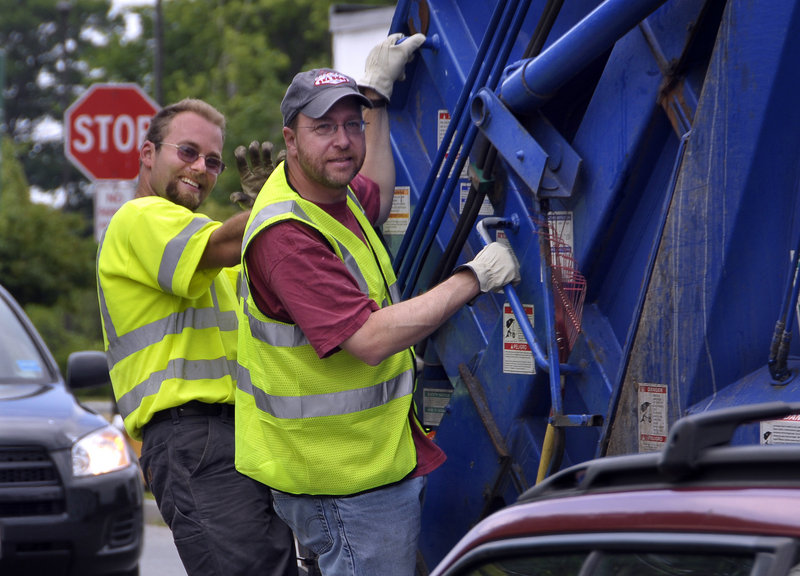PORTLAND – For a minute, it was just how I had imagined it would be when I was a boy: I was a garbage man, riding on the back of the garbage truck.
I gripped the truck’s handles tightly as the breeze cooled me off on a humid, 85-degree day.
Then the truck stopped in front of a house on St. John Street and I hopped off the truck’s little rear standing platform. I felt a twinge of pain in my heel from landing on some uneven pavement, then winced again when I saw a bunch of ripped-open garbage bags, with fast-food wrappers and other debris scattered about the sidewalk.
I had been told earlier that in Portland, garbage had to be in blue bags to be collected. What about stuff spilled out of the blue bags?
“When it’s obvious they put the stuff in bags, but it got ripped open, we do our best to pick it up,” said Nick Albano, 30, a 10-year garbage-collecting veteran who was sharing his spot on the back of the truck with me. “The main thing is not to touch anything with your hands if you don’t have to.”
In this case, we had gloves on, so it wasn’t too difficult to throw the wrappers back in the bags, then toss the bags into the compacting end of the truck.
But later, in front of a single-family house on Massachusetts Avenue, we ran into a much larger and looser pile of refuse that included chicken and rib bones, as well as several heavily soiled diapers. For that mess, Albano used a rake to get the stuff into an empty recycling bin before tossing the contents into the truck.
The potential for messes like these is great. A garbage collector in Portland visits about 900 homes a day, and each truck can hold about 12 tons of compacted refuse. The garbage collectors work in teams of two: one person driving, one hanging on in back. For the one hanging on in back, that means 900 hops down to the ground and 900 hops back up while grabbing a metal handle.
I was told the most common injuries among garbage collectors are twisted ankles from the hop down, and shoulder injuries from grabbing the handle as the truck pulls away.
I can understand this. Several times after I threw garbage bags into the truck, I barely had time to grab hold of the metal handle before Al Stults — who was driving the truck I worked on — began to pull away.
Stults, who has been collecting city trash for 28 years, does not waste time. While Albano and I were collecting bags, Stults would jump out of his driver’s seat and get the trash from the next house.
Stults’ speed had a purpose to it. The trash collectors work on an “incentive schedule.” If the three trucks working in Portland on any given day finish the four routes scheduled for pickup that day, they can go home early and still get paid for a full day’s work. On the day I worked, it looked like they’d be done at least two hours before their 6:30 a.m.-to-3 p.m. shift was officially over.
“There are drivers who are even faster than Al,” said Albano, as we zipped past the Kiwanis Community Pool on Douglass Street.
Some other hazards of riding on the back of the truck include low-hanging tree branches and bumps in the road. Stults tried to avoid the branches and made a wavy hand motion in his rearview mirror to tell us of approaching bumps.
When Stults would speed up, my knuckles would go white as I grabbed the handle as hard as I could. Albano was more relaxed — he’s spent 10 of his 30 years either hanging on, or driving, a garbage truck.
The smell of all the compacted garbage didn’t bother him, either — though he said it sometimes bothers others when he goes into a store or public place right after work.
Nor was Albano bothered by the sight of the swarms of maggots we saw on a couple of bags. Usually they were in barrels — which apparently had not been cleaned well and had had bags stored in them. The sight of crawling creatures made me queasy, especially coupled with the constant motion of climbing on and off the truck.
But not Albano.
“I can eat my sandwich back here and it doesn’t bother me a bit,” he said.
the time I joined Albano and Stults around 10 a.m., Albano had worked up a good sweat working the back of the truck. He told me it’s like having a gym membership. You’re constantly stepping up and down and heaving trash bags that might weigh 75 or 80 pounds.
A couple of times I went to grab bags with one hand, then realized I couldn’t budge them unless I used both hands. One bag was filled with several dozen blocks of wood.
At another stop, Albano found a large kitchen knife on the ground near the garbage bags. At that point, he warned me that other sharp things could be lurking in bags and barrels as well. He once got cut badly on the hand by the shards of a broken glass pitcher. Stults told me he had once been stuck by a hypodermic needle and had to go to the hospital for treatment.
“A lot of people don’t think about what they throw out, or what we have to do with it,” said Stults, 60. “They just know when they get home, it’s gone.”
Staff Writer Ray Routhier can be contacted at 791-6454 or at:
rrouthier@pressherald.com
Send questions/comments to the editors.



